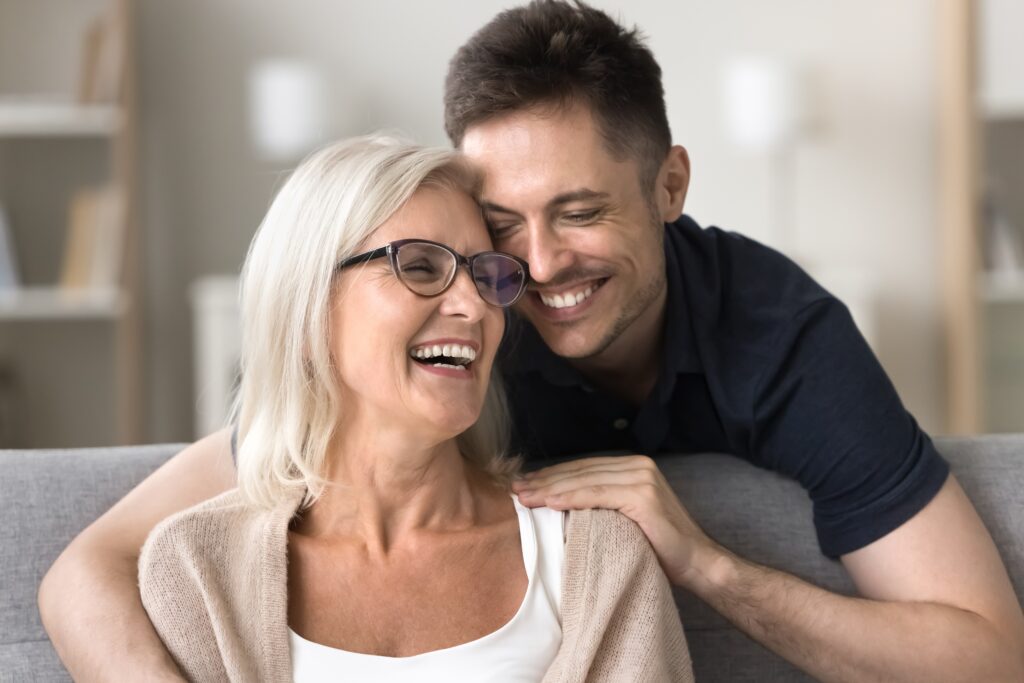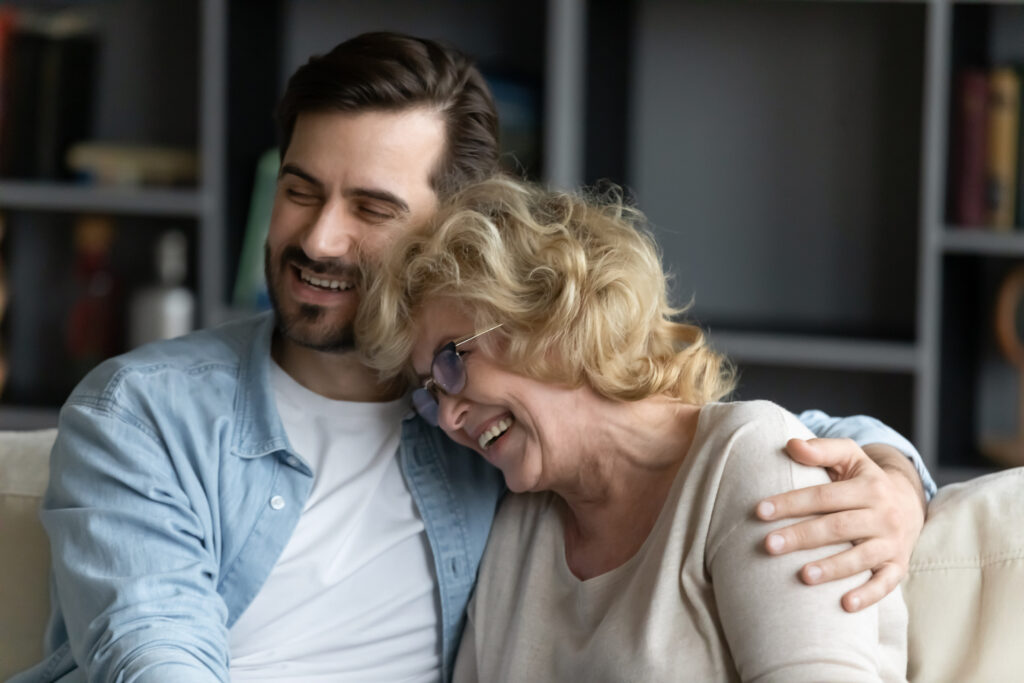They may sound harmless, but these common phrases reveal hidden biases about growing older.

You’d think by now, with all the discussions around aging and inclusivity, that people would be a little more mindful in how they talk about growing older. But somehow, the same cringeworthy phrases keep surfacing, wrapped in smiles and good intentions. These remarks might be tossed out as compliments or friendly observations, but they often land with a sting—especially when they highlight age as something to be apologized for or downplayed.
What makes it worse is that the people saying these things usually don’t even realize they’re being offensive. They think they’re being nice, maybe even flattering. But these so-called “innocent” comments actually reflect deeper societal biases that suggest aging is something to be pitied or fixed. If you’ve ever had to grit your teeth and smile through one of these exchanges, you’re not alone. Here are 12 everyday remarks that sound polite—but carry hidden jabs about aging.
1. “You look great for your age.”

At first glance, this might feel like praise. But when you break it down, it reveals an assumption that people your age usually don’t look great. The phrase creates a comparison to an unspoken baseline—one that suggests you’ve managed to beat the odds. Instead of simply recognizing that you look good, it ties your appearance directly to your age, turning what could be a genuine compliment into something that feels more like a veiled jab.
What makes it worse is that it reinforces the idea that aging naturally means losing beauty or vitality, according to authors at the Pacific Neuroscience Institute. It’s a backhanded pat on the back that reminds you of your number instead of just celebrating how you show up in the world. If someone really wants to compliment you, they don’t need to attach a qualifier to it. Just say, “You look fantastic.” Period.
2. “You’re still so active!”

This phrase might be meant to celebrate your lifestyle, but the emphasis on “still” gives it away. It suggests that being active at your age is rare or surprising, as if you’re defying some kind of age-based limitation. The surprise reveals a quiet assumption that aging means slowing down, giving up, or sitting still. It doesn’t come from a place of real understanding—it comes from someone’s narrow expectations.
Older adults don’t need permission to be energetic or vibrant. Many stay active through travel, hobbies, work, and exercise well into their later decades, as stated by Erica Manfred at Life Experienced. Framing activity as an anomaly reinforces outdated stereotypes that don’t reflect today’s realities. Instead of being impressed that someone is “still” active, how about recognizing the strength and intention it takes to live that way—at any age?
3. “You don’t look that old!”

This one always comes with an awkward smile, like the person thinks they’re doing you a favor. But it begs the question: what does “that old” even mean? It’s as if aging has a look that we should all dread, and if you don’t fit the mold, you deserve special praise. The comment places age and appearance in opposition, treating looking “old” like a failure and “young” as the goal.
Aging isn’t something to be ashamed of—it’s part of life, and everyone does it differently. Telling someone they don’t “look that old” is another way of saying, “You’re lucky you’ve escaped the usual toll.” But there shouldn’t be a toll in the first place. We need to rethink what it means to look your age—and maybe stop acting like that’s a bad thing, as shared by Stan Goldberg in his blog.
4. “You must’ve been beautiful when you were younger.”

This one cuts deeper than people realize. On the surface, it sounds like a compliment—acknowledging someone’s past beauty. But underneath, it’s saying, “That beauty is gone now.” It places value squarely in the past, suggesting that what you once were is somehow better than who you are now. That kind of thinking can feel incredibly invalidating.
Everyone wants to be seen and appreciated in the present—not as a relic of their former self. This comment dismisses the idea that beauty can evolve with age, taking on new forms that are equally powerful and worthy. Instead of focusing on a person’s “used to be,” why not appreciate the strength, presence, and beauty they carry now?
5. “At least you’re young at heart.”

This phrase tries to be sweet, but it comes with baggage. It implies that being young—at least in spirit—is still the ideal. Being “young at heart” is praised as if it’s a lifeline to relevance, joy, and energy, while being “old at heart” is something to be avoided or pitied. The underlying message? Aging itself is something to mentally escape from.
But there’s so much richness in growing older: deeper confidence, clarity, and emotional maturity that only comes with time. Being “young at heart” shouldn’t be the only way to be seen as vibrant or fun. Maybe it’s time we start valuing “wise at heart,” “kind at heart,” or “brave at heart” just as much—because those qualities don’t fade with age. They often grow.
6. “You’re aging gracefully.”

At first blush, this sounds like high praise. But when you hear it often, it starts to feel like a trap. What exactly does “gracefully” mean, and who decides the rules? This comment implies there’s a correct way to age—usually quietly, stylishly, without too many visible signs of the process. It sets an invisible bar that many feel pressured to meet.
The truth is, aging is personal and can be messy, beautiful, empowering, and complicated all at once. There’s no one “graceful” way to do it. People shouldn’t be expected to hide their wrinkles or mask their truth to be deemed acceptable. Let people age on their own terms—whether that looks graceful to others or not.
7. “I hope I look as good as you when I’m your age.”

This one usually comes with wide eyes and genuine admiration—but hidden in that sentiment is a surprise that you look the way you do. It implies that looking good at your age is an exception, not the norm. It also subtly separates the speaker from you, creating an “us and them” gap that reinforces age differences as something strange or noteworthy.
It’s okay to admire someone’s appearance, but linking it to age can make the compliment feel conditional. Would they still say it if they didn’t know how old you were? Probably not. Beauty, style, and confidence exist across all age groups—and shouldn’t be treated like rare finds in older people.
8. “You’re such a silver fox!”

This one’s often used with charm or humor, especially for men. But it still reduces you to a cliché—the good-looking older person with gray hair. It treats your appearance like a novelty, as if it’s shocking that you can be attractive and older at the same time. It might feel better than some of the alternatives, but it still boxes you in.
Being called a “silver fox” might be fun for a moment, but it quickly becomes limiting. People are more than their hair color or their perceived sex appeal. Aging should be celebrated for all the complexities it brings, not just the parts that happen to still align with youthful standards of beauty. We’re not characters in a rom-com—we’re real people.
9. “You’ve aged well.”

This comment feels like a pass/fail judgment. It ranks how successfully you’ve weathered time’s effects, as if that’s the most important thing to measure. It focuses narrowly on your exterior, suggesting that your appearance is what matters most when evaluating how you’ve aged.
But aging “well” isn’t about hiding the years—it’s about living them. Your value isn’t determined by how few wrinkles you have or how closely you resemble your younger self. It’s in your stories, your resilience, your sense of humor, and your presence. Let’s stop rating people on how time has treated them and start appreciating how they’ve lived through it.
10. “You’ve got plenty of good years left.”

This sounds like encouragement—but really, it’s a reminder of the clock ticking. It implies that your best years are behind you, and you’ve only got a few decent ones left before you fade into irrelevance. That’s not exactly the uplifting message most people are hoping for.
Aging doesn’t come with a countdown. Every stage of life can bring joy, growth, and connection. Suggesting there’s a shrinking window of “good years” limits what people believe is possible. Instead of measuring what’s left, maybe we should be celebrating what’s here, right now.
11. “Age is just a number.”

This phrase gets tossed around as a feel-good motto, but it flattens the experience of aging. Age is more than a number—it’s a marker of everything you’ve lived through, the hard-won lessons, and the triumphs no one else sees. Treating it like a footnote dismisses the depth of your journey.
It’s fine to say that age doesn’t define you—but it does inform who you are. There’s power in honoring the years you’ve lived. By reducing age to “just a number,” we lose the chance to acknowledge and appreciate all the richness it brings.
12. “You’re not old, you’re just older.”

This attempt at softening the blow makes it sound like “old” is a dirty word. But aging doesn’t need euphemisms—it needs acceptance. Saying “older” like it’s a workaround reinforces the idea that old age is something we shouldn’t say out loud, let alone embrace.
The truth is, there’s nothing wrong with being old. There’s dignity in those years, in the experience and perspective they bring. Trying to mask the word with gentler language just continues the cycle of shame and discomfort. It’s time to drop the euphemisms and start speaking about aging with honesty and respect.
